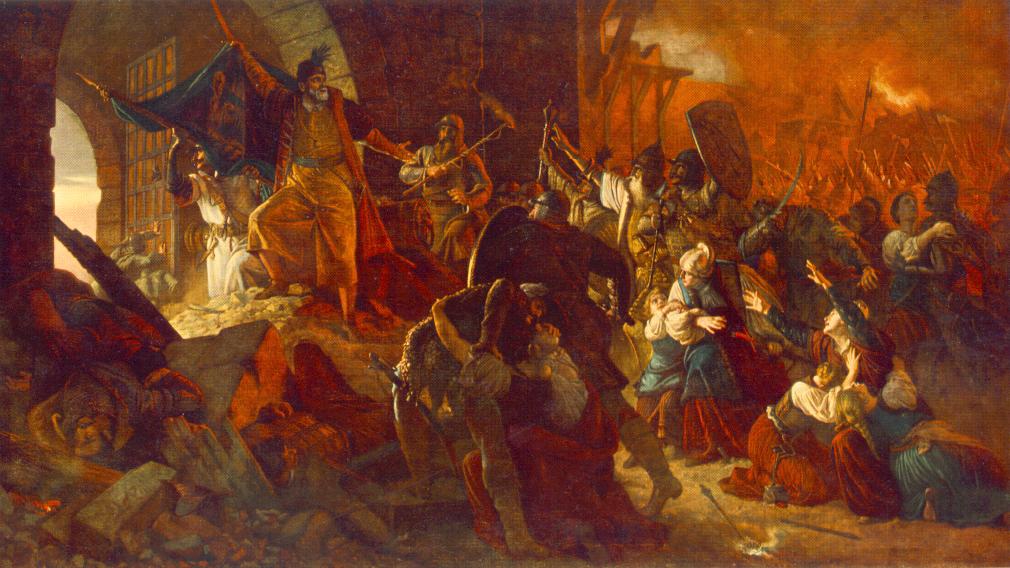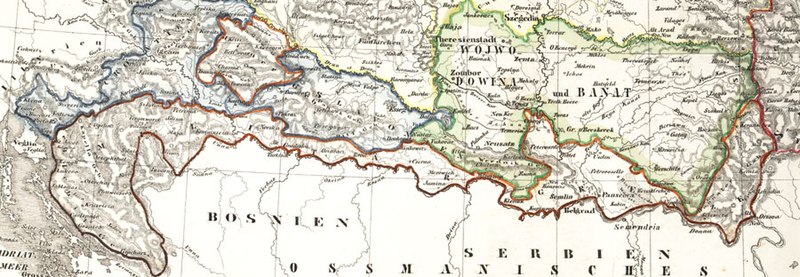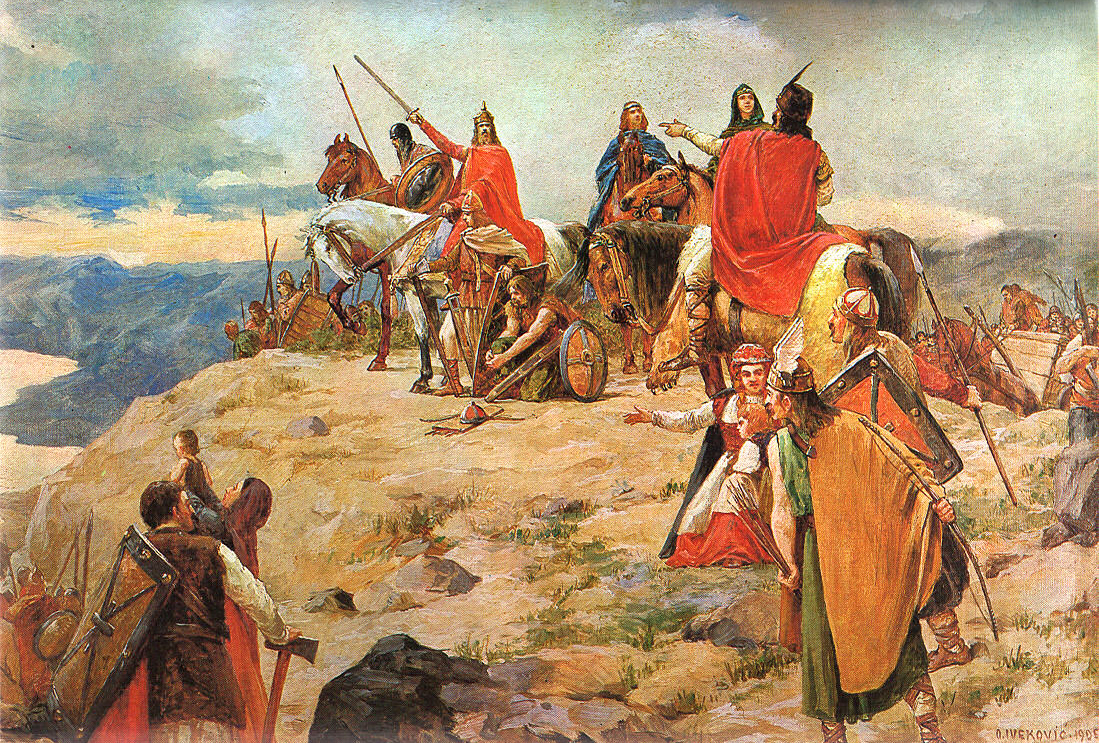- 16 May 2015 19:02
#14557471
In the honor of eternal defense of Mother Europe by people of Croatia against Muslim invaders.
In 1566, from August 5 to September 7, Count Nikola Šubić Zrinski and his small warrior force of 2250 heroically defended the little fortress of Siget against the whole Ottoman army of at least 170,000 soldiers with powerful artillery, led by Suleiman the Magnificent in person who finally went forth to carry out his dream of conquering Europe in the name of Islam.
After over a month of exhausting and bloody struggle the few remaining defenders retreated into the old town for their last stand.
The Sultan Suleiman the Magnificent tried to entice Count Zrinski to surrender, ultimately offering him leadership of Croatia under Ottoman influence,Count Zrinski did not reply and continued to fight to the end.
Sultan Suleiman the Magnificent died in his tent, his death was kept secret from Ottoman army in order to keep already crumbling morale of army.
The final battle began on 7 September, the day after Suleiman's demise. By this time, the fortress walls had been reduced to rubble by mining with explosives and wood fueled fires at the corners of the walls. In the morning an all-out attack began with fusillades from small arms, "Greek fire", and a concentrated cannonade.Soon the castle, the last stronghold within Siget, was set ablaze.
The Ottoman army swarmed through the city, drumming and yelling.
Count Nikola Šubić Zrinski prepared for a last charge addressing his troops:
“ ...Let us go out from this burning place into the open and stand up to our enemies. Who dies – he will be with God. Who dies not – his name will be honoured. I will go first, and what I do, you do. And God is my witness – I will never leave you, my brothers and knights!... ”
Count Nikola did not allow the final assault to break into the castle.
As the Turks were pressing forwards along a narrow bridge the defenders suddenly flung open the gate and fired a large mortar loaded with broken iron, killing 600 attackers.
Count Nikola then ordered a charge and led his remaining 600 troops out of the castle into his last stand against entire Ottoman army.
After he used his two matchlock pistols, he continued cutting Turks with his sword, only to fall from his horse due to many wounds.
His knights rushed around him to defend him and shared the fate of all other Croat warriors that day.
Before charging forth from castle,Zrinski ordered a fuse be lit to the powder magazine.
After cutting down the last of the defenders the besiegers poured into the fortress. The Ottoman Army entered the remains of Siget and fell into the booby trap,thousands perished in the blast when the castle's magazine exploded.
Count Nikola inspiring his men before last charge.

In his honor, this song was written by Franjo Marković.
To battle, to battle!
Unsheathe your swords, brethren,
Let the enemy know how we die!
Our city already burns,
The heat is already reaching us:
Their roar resounds,
Their rage is rampant!
Our chests flare up as that fire,
The roar is silenced by the rattling of our swords!
All of you, kiss Zrinski
As brethren would kiss one another!
Follow him to the gates,
You, faithful heroes!
Now, brethren!
Load the rifles, pistols,
Our thunders, our bang,
Let them roar, topple, harry!
Let us grind our fierce swords,
Make them cut harder, harder!
Load the rifles, pistols,
Our thunders, our bang,
Let them roar, topple, harry!
Good bye and be well,
Our home of old,
Oh, good bye,
From everywhere
The grim enemy comes
Already they plan
To bury your sacred body,
But they won't!
All your sons move to the fight for you!
Our home, you will stand forever!
Into the fight, to the fight!
For the home, for the home now to the fight!
Even if the infernal might
Raises its knife at it;
To the fight!
We are few, but courageous!
Who, who will bring him down?
Death to the devil, death!
For the home, to the fight, For the home, to the fight
To die for your homeland - such a delight!
Against the enemy! They shall die!
In 1566, from August 5 to September 7, Count Nikola Šubić Zrinski and his small warrior force of 2250 heroically defended the little fortress of Siget against the whole Ottoman army of at least 170,000 soldiers with powerful artillery, led by Suleiman the Magnificent in person who finally went forth to carry out his dream of conquering Europe in the name of Islam.
After over a month of exhausting and bloody struggle the few remaining defenders retreated into the old town for their last stand.
The Sultan Suleiman the Magnificent tried to entice Count Zrinski to surrender, ultimately offering him leadership of Croatia under Ottoman influence,Count Zrinski did not reply and continued to fight to the end.
Sultan Suleiman the Magnificent died in his tent, his death was kept secret from Ottoman army in order to keep already crumbling morale of army.
The final battle began on 7 September, the day after Suleiman's demise. By this time, the fortress walls had been reduced to rubble by mining with explosives and wood fueled fires at the corners of the walls. In the morning an all-out attack began with fusillades from small arms, "Greek fire", and a concentrated cannonade.Soon the castle, the last stronghold within Siget, was set ablaze.
The Ottoman army swarmed through the city, drumming and yelling.
Count Nikola Šubić Zrinski prepared for a last charge addressing his troops:
“ ...Let us go out from this burning place into the open and stand up to our enemies. Who dies – he will be with God. Who dies not – his name will be honoured. I will go first, and what I do, you do. And God is my witness – I will never leave you, my brothers and knights!... ”
Count Nikola did not allow the final assault to break into the castle.
As the Turks were pressing forwards along a narrow bridge the defenders suddenly flung open the gate and fired a large mortar loaded with broken iron, killing 600 attackers.
Count Nikola then ordered a charge and led his remaining 600 troops out of the castle into his last stand against entire Ottoman army.
After he used his two matchlock pistols, he continued cutting Turks with his sword, only to fall from his horse due to many wounds.
His knights rushed around him to defend him and shared the fate of all other Croat warriors that day.
Before charging forth from castle,Zrinski ordered a fuse be lit to the powder magazine.
After cutting down the last of the defenders the besiegers poured into the fortress. The Ottoman Army entered the remains of Siget and fell into the booby trap,thousands perished in the blast when the castle's magazine exploded.
Count Nikola inspiring his men before last charge.

In his honor, this song was written by Franjo Marković.
To battle, to battle!
Unsheathe your swords, brethren,
Let the enemy know how we die!
Our city already burns,
The heat is already reaching us:
Their roar resounds,
Their rage is rampant!
Our chests flare up as that fire,
The roar is silenced by the rattling of our swords!
All of you, kiss Zrinski
As brethren would kiss one another!
Follow him to the gates,
You, faithful heroes!
Now, brethren!
Load the rifles, pistols,
Our thunders, our bang,
Let them roar, topple, harry!
Let us grind our fierce swords,
Make them cut harder, harder!
Load the rifles, pistols,
Our thunders, our bang,
Let them roar, topple, harry!
Good bye and be well,
Our home of old,
Oh, good bye,
From everywhere
The grim enemy comes
Already they plan
To bury your sacred body,
But they won't!
All your sons move to the fight for you!
Our home, you will stand forever!
Into the fight, to the fight!
For the home, for the home now to the fight!
Even if the infernal might
Raises its knife at it;
To the fight!
We are few, but courageous!
Who, who will bring him down?
Death to the devil, death!
For the home, to the fight, For the home, to the fight
To die for your homeland - such a delight!
Against the enemy! They shall die!
Rivers change course over many lifetimes, and eventually all bridges tumble down.










 Sources from those era always grossly exaggerate their enemy's number, anyway the point of this thread is?
Sources from those era always grossly exaggerate their enemy's number, anyway the point of this thread is?





















 - By Pants-of-dog
- By Pants-of-dog